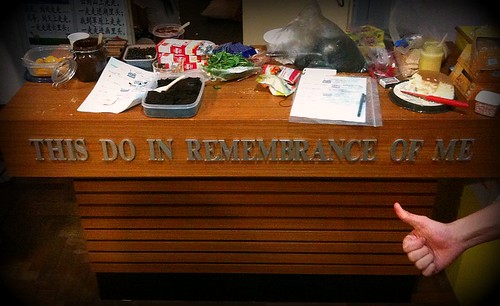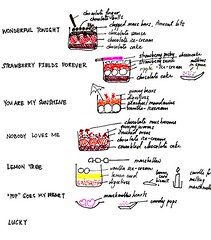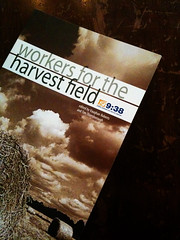This Do In Remembrance of Me
One of the best things I learnt from the very well thought-out OMF missionaries in Phnom Penh, Cambodia, is to consider the practical human aspect of evangelism: that is to say, when one does evangelism, one is also modelling to others how evangelism should take place. (That the gospel should be preached faithfully (with adequate helpings of judgement and hell) is a given.) Teaching English and conducting medical missions have been traditional ways of making inroads into certain societies. But missionaries began to realise that because of the pervasiveness of such methods, the locals let themselves become dependent on foreign missionaries, thinking that they could never reach their fellowmen for Christ because they knew neither English nor medicine.
We had great fun at the youth evangelistic Easter event generally attempting not to be the operative cause of guests meeting their Maker.
The tweens were meant to play an active role not only in inviting friends to hear the good news that added a holiday to the Singapore calendar, but also provide the entertainment and help in ensuring the smooth running of the cafe-style space with root beer and lemonade on tap and made-to-order desserts.
Had to figure out how to model the backstage element of this ministry - the food and drink for the cafe. While 3D Wilton-approved icing and fondant sculptures perched atop cupcakes and other confections would be delightful and attention-grabbing and would have made the recipients very happy, they might have been a great discouragement to teenagers thinking of organising their own event - if they didn't have baking skillz, decorating talent, maids or mothers who were willing to help, they might think that they would never be able to do this by themselves.
Assembling dessert cups layered with store-bought stuff seemed an excellent way of demonstrating that even with zero culinary talent and a budget of S$50 for 55 mouths, budget-store and discount shopping would yield excellent results that made guests quite cheerful (and receptive).
Since several of the young people started working in fast food joints as soon as they turned 14 (Diner Dash, Sushi Chef or current time-management game to the more comfortably-off), they were able to settle into a routine quickly with minimal instruction.
Arguably, people who are adamant and urgent about gossiping the gospel to their neighbours will, naturally, be creative about their methods. But it would be right and proper not to discourage even in small ways, innit.
We had great fun at the youth evangelistic Easter event generally attempting not to be the operative cause of guests meeting their Maker.
The tweens were meant to play an active role not only in inviting friends to hear the good news that added a holiday to the Singapore calendar, but also provide the entertainment and help in ensuring the smooth running of the cafe-style space with root beer and lemonade on tap and made-to-order desserts.
Had to figure out how to model the backstage element of this ministry - the food and drink for the cafe. While 3D Wilton-approved icing and fondant sculptures perched atop cupcakes and other confections would be delightful and attention-grabbing and would have made the recipients very happy, they might have been a great discouragement to teenagers thinking of organising their own event - if they didn't have baking skillz, decorating talent, maids or mothers who were willing to help, they might think that they would never be able to do this by themselves.
Assembling dessert cups layered with store-bought stuff seemed an excellent way of demonstrating that even with zero culinary talent and a budget of S$50 for 55 mouths, budget-store and discount shopping would yield excellent results that made guests quite cheerful (and receptive).
Since several of the young people started working in fast food joints as soon as they turned 14 (Diner Dash, Sushi Chef or current time-management game to the more comfortably-off), they were able to settle into a routine quickly with minimal instruction.
Arguably, people who are adamant and urgent about gossiping the gospel to their neighbours will, naturally, be creative about their methods. But it would be right and proper not to discourage even in small ways, innit.
Labels: Ministry


























